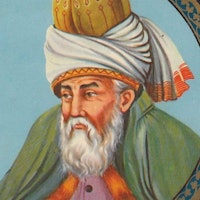If you don’t try to fly, and so break yourself apart, you will be broken open by death—when it’s too late for all you could become.
Jalaluddin Mevlana Rumi

Break Yourself Apart
Topic: Self-Cultivation & Health
Be with those who help your being.
Don’t sit with indifferent people, whose breath
comes cold out of their mouths.
Not these visible forms, your work is deeper.
A chunk of dirt thrown in the air breaks to pieces.
If you don’t try to fly,
and so break yourself apart,
you will be broken open by death
when it’s too late for all you could become.
Leaves get yellow. The tree puts out fresh roots
and makes them green.
Why are you so content with a love that turns you yellow.
Jalal ad-Din Muhammad Rumi, born on September 30, 1207, and also known as Jalaluddin Mevlana (Mawlānā) Rumi, J. M. Rumi, or simply as Rumi in the Western world, was an extraordinary poet, philosopher, and Sufi mystic. He was a prominent figure in the Islamic world, born in the region of present-day Afghanistan, then within the greater Persian Empire, and later settled in Konya, present-day Turkey. Rumi's passionate love for humanity and his deep spiritual insights transcended geographical, linguistic, and cultural barriers, making his poetry and teachings resonate not only within the Islamic world but also with audiences globally.
Rumi's spiritual journey led him to develop a unique approach to Sufism that emphasized love, tolerance, and the pursuit of enlightenment. He created a fusion of traditional Islamic beliefs with mysticism, nurturing a school of thought that flourished in his followers. They established a sect known to the Western world as the 'Whirling Dervishes', a term derived from their mesmerizing practice of whirling as a form of physical meditation. The proper name for this branch is the Mevlevi order, dedicated to preserving and promoting Rumi's teachings.
In addition to being a mystic, Rumi was an accomplished scholar and theologian who left behind an impressive literary legacy. His best-known work, the Mathnawi or Masnavi, is a six-volume poetic epic that explores themes of love, divine mystery, and human connection to the spiritual world. Rumi's poetic style is marked by profound emotion and philosophical depth, weaving metaphors and allegory to create timeless pieces that continue to inspire readers today. Rumi's influence reaches far beyond his time, as his teachings on love, compassion, and unity continue to touch the hearts of millions, transcending barriers of religion, culture, and era.
Rumi. Jelaluddin Mevlana. "Be with those who help your being." Translated by Coleman Barks, HarperOne, 1995.

Jalaluddin Mevlana Rumi
Theme: Being in Self

About This Jelaluddin Mevlana Rumi Quotation [Commentary]
Jelaluddin Mevlana Rumi’s quote, “A chunk of dirt thrown in the air breaks to pieces. If you don’t try to fly, and so break yourself apart, you will be broken open by death—when it’s too late for all you could become,” underscores the necessity of personal transformation and growth. Rumi uses the image of dirt breaking apart in the air to symbolize the inevitable changes that come with attempting to rise above one’s current state. This metaphor encourages a proactive approach to self-improvement, suggesting that one must endure the fragmentation and discomfort of change to achieve a higher potential. His message is clear: embracing the challenges of growth is essential to realizing one’s fullest capabilities before it is too late.
In the surrounding context, Rumi advises us to “be with those who help your being” and avoid the company of indifferent people. He underscores the importance of choosing companions who foster our spiritual and personal development. This guidance aligns with the theme of “Being in Self,” as it emphasizes the need for conscious associations that nurture our inner journey. Rumi’s reference to the visible forms and deeper work suggests that true self-improvement goes beyond superficial appearances and requires an internal commitment. By surrounding ourselves with supportive and inspiring individuals, we can better navigate the challenges of self-transformation.
Rumi’s reflection on the consequences of not striving for growth—being “broken open by death”—serves as a reminder of the finite nature of life. He implies that avoiding the necessary trials of self-discovery and transformation leads to a life unfulfilled, only to be realized when it is too late to make meaningful changes. This perspective resonates deeply with the theme of “Being in Self,” as it calls for a courageous engagement with life’s trials and an openness to the transformative process. Rumi’s wisdom encourages us to embrace the journey of self-discovery with vigor and resilience, ensuring that we do not miss the opportunity to become all that we are meant to be.
Additional Jelaluddin Mevlana Rumi Quotations
Related Quotes
Copyright © 2017 – 2025 LuminaryQuotes.com About Us